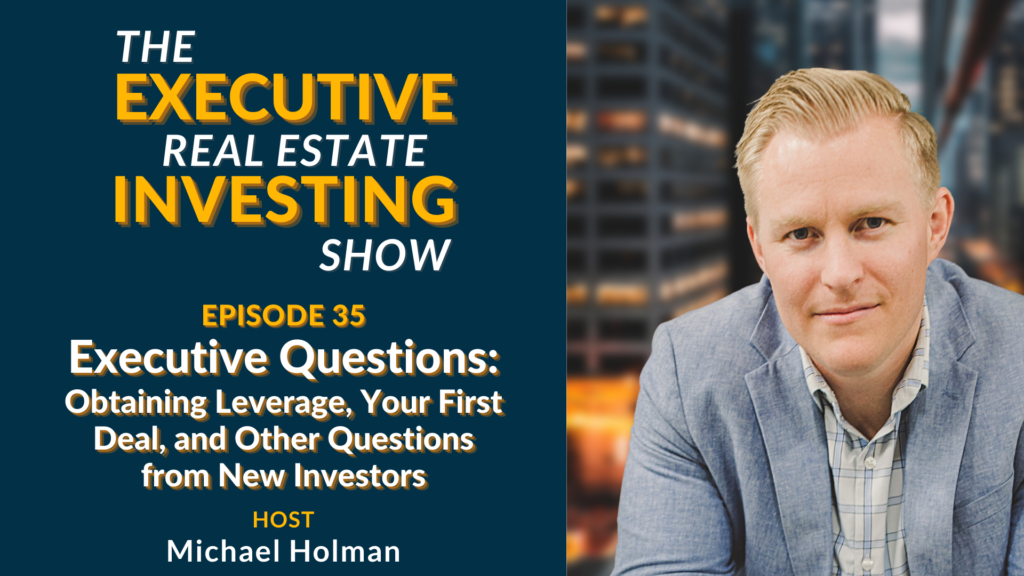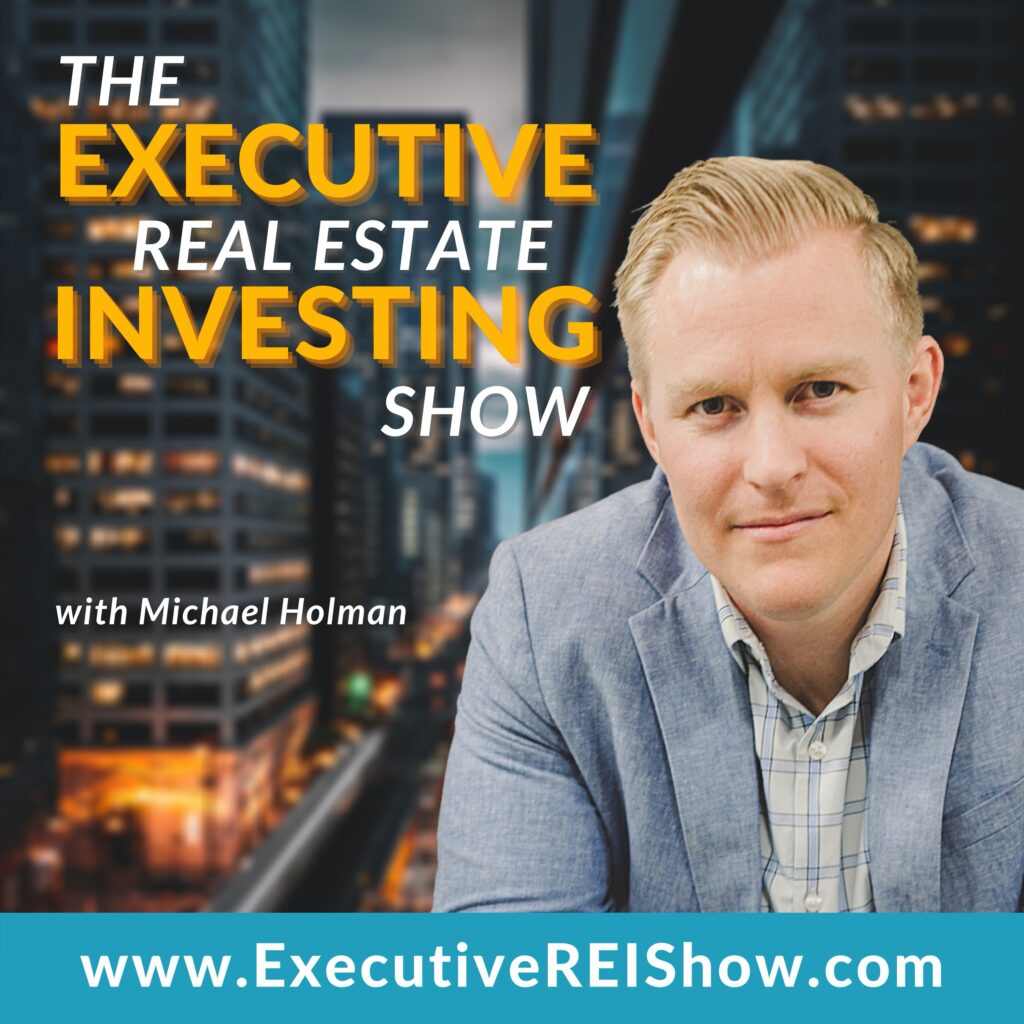
The executive Real estate investing Show
EPISODE 35
Real Estate Investing Q&A: Obtaining Leverage, Your First Deal, and Other Questions from New Investors with Michael Holman
- January 31, 2022
EPISODE SUMMARY
Cap Rates, Covid, and Small Unit Apartments: Michael Holman Answers Listener Questions.
Michael answers questions from listeners on a wide variety of investing topics, like the pros and cons of smaller unit apartments, the effects of COVID-19 on Real Estate asset classes, how to get brokers to take you seriously when you’re first starting out in investing, getting leverage, and how various cap rate changes in assets that Michael invests in.
Listen now as Michael answers these questions and expands on each topic to give his advice, based on years of executive experience.
To the new investors out there: keep asking questions! The only way to succeed in real estate investing is to keep learning and expanding your knowledge. If you want one of your own questions to be answered on an episode of The Executive REI Show, make sure to click HERE to submit your question!
EXECUTIVE TIP
Start Thinking Bigger
LISTEN TO THE PODCAST HERE

The Executive Real Estate Investing Show Podcast
EP 35: REI Q&A: Obtaining Leverage, Your First Deal, and Other Questions from New Investors with Michael Holman
Listen on
READ THE TRANSCRIPT HERE
Note: Audio transcription has been automatically transcribed
Welcome to The Executive Real Estate Investing Show. This podcast is for you, the busy business owner or executive looking to create generational wealth. Here, we’re going to show you how to do that through real estate investing from multifamily to industrial and everything in between. You will become a real estate investing expert. And now, here’s your host, Michael Holman.
Michael Holman: Hello everyone, and welcome to another episode of The Executive Real Estate Investing Show. As always, I’m your host, Michael Holman, excited to have you with me today because it is one of my favorite episodes. It is an executive questions episode. I love these. I love doing them. I love answering your questions. And we have a great list of questions for you today. Excited to go over those.
But first, if you’ve been listening for a little while you like the show, go ahead, go to Apple podcasts, go to Spotify, leave us a rating and review, we’d really appreciate that. We always love hearing from you. So go ahead, give us a review. Give us a rating. Also, if you haven’t been on our website yet, www.ExecutiveREIShow.com. Go check it out, you can sign up for newsletter, you can get all this great Real Estate investing advice, business advice, right into your inbox. It’s fantastic.
You can also ask one of these executive questions that I have with me right now that we’re going to be going through. All sorts of stuff that you can do on the website. So go check it out. Also, if you’re listening to one of the episodes, and you’re thinking, hey, I’d love to connect with that guest or whatever the case may be, you can go into the show notes on that episode, on the website, and you can find how to connect with that person. So check it out www.ExecutiveREIShow.com.
Before we get into these executive questions, I’m going to give executive tips. Today’s executive tip is to start thinking bigger than you’re currently thinking. I’m a big believer of reading a lot of books and I’ve been reading a ton lately. One of the things that I have noticed is a theme. I read a lot of self-help books, I read a lot of Real Estate investing books. I read a lot of those types of books. One of the things that has stuck out to me is, I’ve been reading all of these. There’s one reoccurring theme through almost all these books, and all these authors say the same thing and that is whatever you’re thinking right now it’s too small, you need to start thinking bigger. Then all the steps after that are can, vary a little bit, they’re a little bit different.
But they all start with the same thing and that is, start thinking bigger than you’re currently thinking. I want you to take whatever your goals are, whatever your dreams are, and I want you to think about those for a second. I want you to determine how can I make these bigger? Am I limiting myself by my goals? Go ahead and take a moment to do that, I think you’re gonna be really happy with the results. Once you start thinking bigger, you’re gonna see that all these things start falling into place. That old saying, where there’s a will there’s a way.
You’ll find that is very, very true. Without further ado, we’re gonna get right into these executive questions. First one is from Joseph H. Joseph asks, what is your opinion about investing/owning small apartment buildings, specifically 100 units or less? Joseph, great question and this is pretty common among, the middle-class investor. A lot of people where it’s like hey, I’ve been doing single family homes, I’ve been doing some smaller duplexes or fourplexes or things like that. I really want to retain control, I don’t know if I’m ready to go into like a syndication where they’re doing 200 or 300 units, but I could maybe purchase on my own or just with a few people, 40 units or 50-unit building or something like that.
I don’t have any problem with it. Specifically, I will say that there are certain disadvantages, to owning less units, rather than more units, and all go over those. As far as it being bad, or you’re not going to make any money. I don’t agree with that. Some of the people out there are like, anything less than 100 units is just a terrible idea. I’m not going to do less than 100 units, but that’s because of the way I structure my deals, because I’m a syndicator. I’m a developer. I need the economies of scale that come from 100 Plus units. My deals don’t work as well.
In general, there’s some that do but in general, my deals don’t work the way that I want them to and the way that my investors want them to when they are 40 units. Not to say they can’t, and some often we have had some of those deals that have worked quite well. But that’s not the target because things over 100, 200 units become easier because of the economies of scale for us. I don’t think it’s a bad thing, there’s a few things that I would point out, if I were to do it. Let’s say, Michael is going to go out and buy a 40-unit, apartment complex, the thing that I would definitely do is make sure I have a great management company on board.
The reason for that is, when you’re under 100 units, you don’t have an onsite manager so you’re not getting a full dedicated team to your site. Most likely, at 30,40,50 units most things under 100 units, maybe some right around the 100 mark, don’t have an onsite manager, that’s going to be managing your property full time, which means you’re going to have somebody who somewhere else that comes to your site on a regular basis. It’s easier to go with a management company that’s maybe little less prestigious or it doesn’t have quite as good of reputation, when they’re there full time. Because when you’re there full time, if people are showing up, you can generally get units rented and things like that, because somebody is always there.
If somebody is not there most of the time, and you go with a management company, that’s not very good. That manager just might never show up to your property. They might go weeks between even visiting your site, so you really want in that unit mix, less than 100 units. You really want a management company that you can trust, that’s very high caliber. You need to know that they’re going to go out and be checking on the site regularly, they’re going to be able to lease up the property, even though somebody isn’t there 100% of the time. That is probably the biggest advice that I would have. That’s why it gets so tricky under 100 units. That’s one of the big disadvantages, with these economies of scale, is because under 100 units, units’ property management becomes a little more tricky.
That’s one of the benefits, if you look at the opposite, let’s look at the benefits of going over 100 units. You’re definitely going to have an onsite manager who’s going to be there full time. Whether you self-manage and what I mean by that is you hire an onsite manager, or you have a property management company, or you hire a third party, you’re gonna have an onsite manager, or you’re gonna want to have one if you don’t. You’re gonna have an onsite manager, there’s a huge advantage. Another one of the big advantages of having 100 Plus units, and one of the reasons we do it, we like building nice facilities. All of our new buildings are class A and one of the things we like putting in fantastic amenity packages. One of the apartments we did in Southern Utah, it’s got three pickleball courts, it’s got a swimming pool, a splash pad, hot tub, barbecue.
This is the kind of thing that we like to do on our projects and those things don’t make sense if you have 30,40 units. It’s hard to justify putting in a $300,000 swimming pool when you only have 20, 30,40 units. Because we like to provide a certain lifestyle, and a certain amenity package with all of our apartments, specifically, under 100 units is hard for us. We don’t get the kind of community that my company Overland is generally known for and what we pride ourselves in. You’re just not getting those economies of scale. The other thing is your returns can be similar. You’ll hear people say all the time. Oh, yeah, you got to go over 100 units, do I think it’s usually easier to get a higher return with a higher unit count? Yes, I do. But we’ve had to pass on 500.
If that were the only philosophy you’d think okay, well, 500 units is better than 300 units. We’ve had to pass on 500-unit developments that didn’t make sense. It’s not like as you get bigger it always makes sense, it’s like, well, in that scenario, then 1000 units is better than 500. That’s not always the case. We’ve had to pass on 500 units because it didn’t make sense. But in general, you think about it if each unit is profitable, which you would assume. Let’s say each unit is bringing you more cash flow into your Pocket, than out of your pocket, then in theory, the more units you have the more cash flow coming in and that’s just generally how you would think about that.
Under 100 units, that’s my feelings on it. It’s what’s important to you, if control is important to you, and you have the ability to do it on your own, there’s a lot of people that’s the number one thing. That’s not the number one thing for me. I’m more interested in the deal and the project, everything surrounding that. I’m okay giving up control for a 300-unit deal in a fantastic location and one that I wouldn’t normally be able to get, I’m okay doing that, rather than maintaining control of 20 units. But if you want control, and you’re trying to maintain control, less units could be good. But like I said, the biggest reason I see small apartment projects fail is usually because of the property manager.
You just have to have an amazing on top property manager. So if you’re going to do that, you’re looking for top of the line, I’m not saying the most expensive, but who is it that you can 100 absolutely put your trust in that they’re going to do a great job, because that’s going to go a lot further than if you just go find someone off the street, or somebody who only manages large projects. A lot of times those guys don’t know how to possibly go from okay, we got a team of three staff on every single property to also we have no staff on this property, and we have to send people there, doesn’t make sense.
So, Joseph, great question. Those are my thoughts. I don’t think they’re bad. I prefer over 100 units, I generally will always do over 100 units. But if you find the right deal, if you find a good deal, and you find the right opportunity, under 100 units can work just as well as over 100 units, but it’s all about finding those opportunities. Perfect.
Next question comes from Frederick M. How’s COVID-19 affected the rate of return in the commercial or multifamily projects you’ve done? Interesting question. This is one that we were getting a lot. Back in mid 20s, mid 2020. Even through 2021, we got this question a whole lot. We don’t get this question as much anymore. Most of the projects that we’ve seen it fared very well through COVID. Obviously, nothing’s immune, we have retail properties where we had to deal with some issues. There were some concessions that we had to make with some of our retail users. Because we have a lot of small, triple net lease properties throughout the Midwest. We had to deal with some of that. Overall, I think most people across the board would agree that COVID has redefined some of the landscapes.
But it hasn’t knocked anyone out. You look at it, even one of the things that weren’t hospitality. We do hotels, one of the things that we’ve noticed is a quick and rapid rebound on hotels. I got multiple hotel developments coming up very soon and we’ve gotten feasibility studies from some of the best. We spend $10- $15,000, on these feasibility studies. These market studies that come from the top market research companies in the world. Everybody is assuming a quick recovery in a lot of markets on hospitality. Well, a year ago, everybody thought hospitality was dead, but it’s kind of funny.
Everybody’s talking about how hospitality is recovering, and nobody really wants to lend on it. Have you been to a hotel, or any kind of destination spot over the last year and a half? even a year ago, I went down to Southern Utah to check on one of the projects. I booked it like three weeks ahead. I get the very last room that was available in the hotel, completely packed. We don’t have a lot in the way of professional office right now. That’s not something that I can speak as much to. We do, do medical office, medical offices have been great. We like medical office a lot. We’re getting a little bit of a professional office.
That I think is where the biggest change is coming. Because you have this professional office and the work from home thing and everybody’s dealing with that and what’s that effect? I still come in the office every single day, but I know a lot of people who don’t. That’s the landscape that I see changing the most from COVID. Even retail. I don’t think retail is not going away. At the end of the day, people still need somewhere to go. Even if it’s to eat. Yes, you have things like UberEATS and whatnot, but you still need a restaurant to cook your food.
Retail isn’t going away; it might adjust and have to adapt. There might be less shopping and more restaurants or different things like that. There might be an adjustment. But it’s not like flat out or it’s gonna die. Multifamily been great, storage has been great. All those asset classes done really, well through COVID and it stood up very nicely through the pandemic. That’s all I’m gonna say on COVID. We’ve been through this topic like 100 times, everyone’s eyes have probably glazed over as soon as the word COVID came up. We’re not going to beat that one with the dead horse anymore. But let’s move on.
Curtis R, when you were first starting, how can you get deals to compete for, how do you get brokers to take you seriously and send you listings and really advocate for you? Curtis, this is a question that a lot of people beginning in Real Estate investing struggle with. I see a lot of people in the multifamily syndication space. I just narrow in on it, you get more new people in multifamily syndication than just about any other space and it’s all because a lot of those people own single family homes, rentals, houses, apartments, those are things that all of the beginners really understand. They get it, it makes sense to them. I own something, they live in it, they pay me, I pay my expenses, and I get money. So it’s really, common.
Then that multifamily syndication space, there’s a lot of competition and so the question that I would turn on to you Curtis, how do you think you can get broker’s attention? Understanding that these agents and these brokers are dealing with 10,20, 30,40 other people, just like you, plus probably some institutions, plus some people who are a lot more qualified and capable than you. Now, I’m not saying you can’t get it, don’t get me wrong. I’m not saying that at all. But start thinking because each broker is different. But when you turn the question like that, it starts giving your idea of the amount of effort, time that you have to put into this in order to get a broker’s attention.
If you want to be on a broker’s list, you have to have that broker’s attention. There’s a lot of people more capable, with more money likely than you trying to get those same listings, because everybody wants those best deals. So you’re gonna have to do something that sets you apart from all those other people. If you have $100,000 to put down towards an apartment complex, and you’re trying to go in for 200-unit apartment complex, and you don’t have anything set up, just you $100,000 and you’re trying to get a deal. Trying to go into that broker and saying, I’m trying to compete, I’m more qualified than Mr. Institution who has $100 million in dry powder and ready to go, it’s never gonna work.
You have to compete on what your strengths are. Here’s the honest truth with other things, here’s the other side of this. For better or for worse, people do business with people they like, and know, and trust. You want brokers to send you stuff, you better be top of mind with those brokers. That is the only chance you have to get their attention. Just straight up. You have to differentiate yourself from the competition, somehow, some way and pull your strengths and you got to be able to get their attention, you got to be able to get to know them. Like I said, you got to understand that the people you’re dealing with probably have more money, more experience, more capability than you.
You’re going to have to put in a superhuman amount of effort to get those first deals. Now, it’s a snowball effect, because once you get one deal, usually the next deal will come easier, and the next deal comes easier. This happened to us when we were getting started in Arizona. It was like a snowball effect. You close on like a four and a half million-dollar property and a $2 million property and a $9 million property. And suddenly, everybody perks up and starts going, hey, who are these guys, I need to, also you start finding that people are coming to you, now that can happen to you.
But the hardest one is that first one. You have got to go buck wild; you have to be top of mind all the time with that person and that is the best advice I can give. Because as much as it’s not emotional, you need to be there competing and guess what you’re gonna have to compete probably for 20,30, 40,50, 100 deals before you’re gonna get that first one. But guess what, it’s gonna get less the next time and it’s gonna get less the next time. And also you can start building a track record to show these people hey, I’m possible because the worst thing that an agent or broker could do is waste their time. Especially in today’s market, it is so hot.
They would rather sell the property and they’re not the owner, so I can’t speak for them. But in general, a broker wants to know that somebody can close. Because if you can’t close, there’s 10 other people right behind you who absolutely can. They’re not interested in you dragging them out for 2,3,4 months, and then not being able to close. Those are all the things you got to think. Go put yourself in their shoes, you got to understand brokers enough to go put yourself in their shoes and try and figure out okay, if I was the broker, and someone like me came to me, what would it take for me to say, I’m gonna send this guy some stuff. That’s what you got to do.
Next question comes from Paul R. Paul asks, what is the best way to obtain leverage? Paul, there’s a million ways to obtain leverage, and it varies very much, depending on the asset class, who the sponsors are things like that. Strong sponsor, preferred asset class, you just go down to your bank. If you’re a really strong borrower, and you got $5 million, $10 million, sitting in the bank account, and you’re trying to get a loan on a 150-unit multifamily project you go to just about any lender, and they are gonna lend you money on that project. Not all lenders are created equal. But there’s a million different lenders out there. There’s everything from community banks to national banks, you have private lenders, there are seller financing, you have debt funds. You have an infinite number of lenders.
There are certain things that each lender is going to make sure they have. They’re gonna check your project, they want to know you have a good project and they want to make sure that they’re not going to get burned. The biggest thing for a bank, they want to lend money. Lenders make money by lending money. They want their money out there. The only thing they hate more than not having money lent out, is not getting their money back. All the things that they’re going to focus on when you’re going to get your loan, is they want to be assured they’re going to get their money back and the less assurance they have, the more they’re going to charge you. The more assurance they have, the less they’re going to charge you. It’s not like there’s one lender that moves up and down the scale.
Oftentimes, those are different lenders in different buckets. But they want the assurance that they’re going to get paid back. But the best way if you’re looking and you’re just getting started. Two ways to really start understanding how to go get a loan, how to obtain leverage, that is, go talk to a mortgage broker. Go find someone who’s helping people finance deals that you’re doing, and that is on your team. Go find them and talk with them. You can ask them all the questions, any of the questions that you’d be scared to ask a lender, you can ask them.
The other way is if you say you’re going to skip the mortgage broker, for whatever reason, it’s just start talking to lenders. The only way you’re going to understand how to get the loan that you’re looking for is by talking to them, and it might be 5,10, 15 conversations, and you might fall flat on your face 10 times out of 10. But guess what, you’re gonna know a lot better after you get chastised multiple times from lenders about not knowing what you are doing. You better believe that number 11, you’re gonna know a lot better about what you’re doing then you did on one through 10. Those are the two ways that I would look at. Just start getting an idea. The idea is either go to the source and figure out what they want, or you have to find somebody who’s constantly working with that source of leverage and working through them to get what you need. Those are the best ways that I would say.
Last question comes from Henry Y. Henry asked, what are you seeing in cap rate changes across asset types that you own? This is a great question. In general, and in the past, we’ve been seeing them just going down. For the last few years, they’ve been going down and down. There’s a big question mark happening right now with some of the interest rates and things like that, what are they going to do? They’re going to stall out, are they going to soften, are they going to go up? The answer is I don’t really have a crystal ball for the future. In general, I will say for the last few years, they have been getting more and more compressed.
People can call that different thing, some people will say, hey, we’re in a bubble that compress, it’s going to pop. Some people are saying nope, we’re making market adjustments that they have been building for the last 10 years. We were under supplied for the last 10 years. This is just the result of all of that reaching its crux, or reaching the breaking point, call it whatever you want. Cap rates have been decreasing, consistently across the board. There are only a few asset classes where cap rates have stayed similar. Those are the asset classes that you would generally think of. We’ve seen office and hospitality stay similar. But even in some of those areas, they’re starting to compress as well.
We’re not really seeing things go up right now, most of time, we’re seeing things go down. Like I said, we’re right on the cusp of a potential change, we got interest rates, talking about pricing, and housing markets, and all sorts of stuff that’s happening right now, as I’m recording this. I wish I had more foresight or information to be able to give you a definitive answer. But right now, I’ll tell you right now, I don’t know, this is a question that I want you to ask me again. Ask me again in one month, and I think I’ll have a lot better idea and handle on where we’re at and where we’re going. Right now, there’s just a lot of things kind of in flux, and rising interest rates, like I said, that’s the biggest thing that has a question mark, how is that gonna affect things.
That’s what we’re all looking to try and figure out and understand and see in general, in a vacuum, you would assume if interest rates goes up, prices go down, which means cap rates go up? That’s generally what you see in a vacuum. There’re other factors that potentially go into that, and that we’re dealing with and that’s what I mentioned. This under supply, let’s take apartments, for example, we’ll take my home state of Utah. Utah is under supplied by about 45,000 units. They need 45,000 units of housing, over the next little while, and they’re just super undersupplied.
You look at that, and you wonder, okay, if interest rates go up, cap rates might not change, because there’s so much demand out there, and such little supply, they could remain the same. If you had a perfect balance and supply demand, and interest rates went up, you would then start assuming the cap rates are going to go up as well, because prices are going to go down. But there’s some interesting things at play here. I’m really excited to see how this plays out over the next couple months. And like I said, I hope Henry get back on ask me that question again in a month or two. I hope to have a really good answer for you then too. But it’s going to be an exciting time and interesting to see where the market goes and how the market reacts to some of these changes.
That is, it, everyone. That is our executive questions episode. So glad you could join us. So glad you could ask these questions and I can help answer them. If you have a question that you want to ask. Go to www.ExecutiveREIShow.com. Click on the executive questions button, type in your question, and I will read it and answer for you right on this show and you’re going to get your questions answered. Thank you so much. Once again, if you’re listening on Apple podcast right now, or Spotify, or wherever you’re listening, what I want you to do as soon as you get done with this episode, go ahead and leave us a rating and review would be greatly appreciated and we appreciate your time. We’ll see you next time everyone.
Thank you for listening to The Executive Real Estate Investing Show. Ready to learn more? Go to ExecutiveREIShow.com for more episodes and resources to help you create generational wealth through real estate investing. That’s ExecutiveREIShow.com.
WATCH THE EPISODE HERE
MENTIONED IN THE SHOW
EPISODE ARTICLE

Answering Your Questions: Guidance for New Investors
Newcomers to the real estate investing space often have a lot of questions. And we totally understand! There’s a lot to learn and become educated on when you decide to jump into real estate. We aim to make the information on The Executive REI Show as helpful and actionable as possible. That’s why we routinely take questions from the audience and answer them on an episode of the podcast. In Episode 35 of The Executive
EPISODE NOTES
- The first question comes from Joseph H. “What is your opinion about investing/owning small apartment buildings, specifically 100 units or less?” Michael finds that this is a common question from people who have had success with single-family or duplexes, and are looking for the next step.
- “I don’t have any problem with it specifically. I will say that there are certain disadvantages to owning less units rather than more units.” The first issue is management. “The thing that I would definitely do is make sure I have a great management company on board. When you’re under 100 units you don’t have an on-site manager, and so you’re not getting a full dedicated team to your site. So most likely at 30,40,50 units most things under 100 units don’t have an on-site manager that’s going to be managing your property full-time.” Not having someone on site means losing out on showing units to potential renters, and generally being in the dark when it comes to any problems that could arise.
- Finding a good management company is key for larger properties and is vital for smaller properties. “With the management company that’s not very good, that manager just might never show up to your property. They could go weeks between even visiting your site. You really want a management company that you can trust, that’s very high caliber because you need to know that they’re going to go out and be checking on the site regularly. They’re going to be there to be able to lease up the property.”
- For Michael, it all comes down to the economy of scale. “We like building nice facilities. All of our new builds are class A and one of the things we like is putting in fantastic amenity packages. One of the apartments we did in southern Utah has three pickleball courts, it’s got a swimming pool, a splash pad, hot tub, BBQ. This is the kind of thing that we like to do in our projects, and those things don’t make sense if you have 30-40 units. It’s hard to justify putting in a $300,000 swimming pool when you only have 20-40 units.”
- Some RE investors prefer the control that owning smaller units gives them. And that’s okay, too. “If control is important to you and you have the ability to do it on your own, there’s a lot of people that that’s the number one thing. That’s not the number one thing for me. I’m more interested in the deal and the project, everything surrounding that. I’m okay giving up control for a 300 unit deal in a fantastic location and one that I wouldn’t normally be able to get. I’m okay doing that rather than maintaining control of 20 units.”
- The next question comes from Frederick M. “How has Covid-19 affected the rate of return in the commercial or multi-family projects you’ve done?” Another common question, simply because so many people have been affected by Covid. “Most of the projects that we’ve seen have fared very well through Covid, though obviously nothing’s immune. Overall I think most people across the board would agree that Covid has redefined some of the landscapes but it hasn’t knocked anyone out.”
- One of Overland’s concentrations is hospitality (hotels), and they have seen a quick recovery in 2021 to today. “I went down to southern Utah to check on one of the projects, I booked it like three weeks ahead, and I got the very last room that was available in that hotel!” So of course, Michael has several hospitality projects in the works.
- Michael can’t speak on how professional office spaces have fared during Covid, because he does not deal in that type of property. He says that medical offices and even retail have fared well or are on the way to a full recovery. “I don’t think retail’s going away. At the end of the day people still need somewhere to go, even if it’s to eat out. Yes you have things like Uber eats and whatnot but you still need a restaurant to cook your food. So retail isn’t going away.”
- “Multi-family has been great, storage has been great. All those asset classes have done really well through Covid and it actually stood up very nicely through the pandemic.”
- The next question comes from Curtis R. “When you are first starting, how can you get deals to compete for? How do you get brokers take you seriously and send you listings, and really advocate for you?” It’s a common question with a difficult answer. It takes a lot of time and effort to get a broker’s attention. If you’re just getting started in RE investing, “There’s a lot of people more capable with more money likely than you trying to get those same listings, because everybody wants those best deals, so you’re going to have to do something that sets you apart from all those other people.”
- “You have to compete on what your strengths are. People do business with people they like and know and trust. If you want brokers to send you stuff, you better be top of mind with that broker.” Michael says that you’re going to have to put in a “superhuman effort” to get their attention. But it will pay off. “Once you get one deal usually the next deal becomes easier, and the next deal becomes easier. And all of a sudden everybody perks up and starts going ‘hey who are these guys?’”
- Question four is from Paul R. “What is the best way to obtain leverage?” Michael says that there are a million ways to obtain leverage. “There’s everything from community banks to national banks; you have private lenders, there’s seller financing, you have debt funds. I mean you have an infinite number of lenders.” Of course, lenders always tend to look for the same things in investments. “They want to know that you have a good project and they want to make sure that they’re not going to get burned. They want to be assured they’re going to get their money back, and the less assurance they have the more they’re going to charge you. The more assurance they have the less they’re going to charge.”
- One way to learn all about leverage and financing is to talk to a mortgage broker. “Go find someone who’s helping people finance deals that you’re doing and that is on your team. Go find them and talk with them. You can ask them any of the questions that you’d be scared to ask a lender.”
- The harder way to do this is to talk to actual lenders. “The only way you’re going to understand how to get the loan that you’re looking for is by talking to them and you might fall flat on your face 10 times out of 10 but guess what you’re going to know a lot better after you get chastised multiple times from lenders about not knowing what you’re doing. By number 11 you’re going to know a lot better about what you’re doing.” It might not be pretty, but it works.
- The final question comes from Henry Y. “What are you seeing in cap rate changes across asset types that you own?”
- “For the last few years, they’ve been going down and down. There’s a big question mark happening right now with some of the interest rates–what are they going to do, are they going to stall out, are they going to soften, are they going to go up?” Michael doesn’t have a crystal ball, so he can’t prognosticate. “Some people will say ‘hey we’re in a bubble, they’re compressed it’s gonna pop,’ some people are saying ‘nope we’re making market adjustments that have needed to be made.’” Generally residential housing (multifamily) has been undersupplied, and the build rates have kept up with the demand. “Cap rates have been decreasing pretty consistently across the board. There’s only a few asset classes where cap rates have stayed fairly similar and those are the asset classes that you would generally think, like office and some hospitality stay similar. But even in some of those areas they’re starting to compress as well, so we’re not really seeing things go up right now. Most of the time we’re seeing things go down.”
- Of course, all of that could change if interest rates change. So stay tuned. “This is a question that I want you to ask me again. Ask me in one month and I think I’ll have a lot better idea and handle on where we’re at.”







